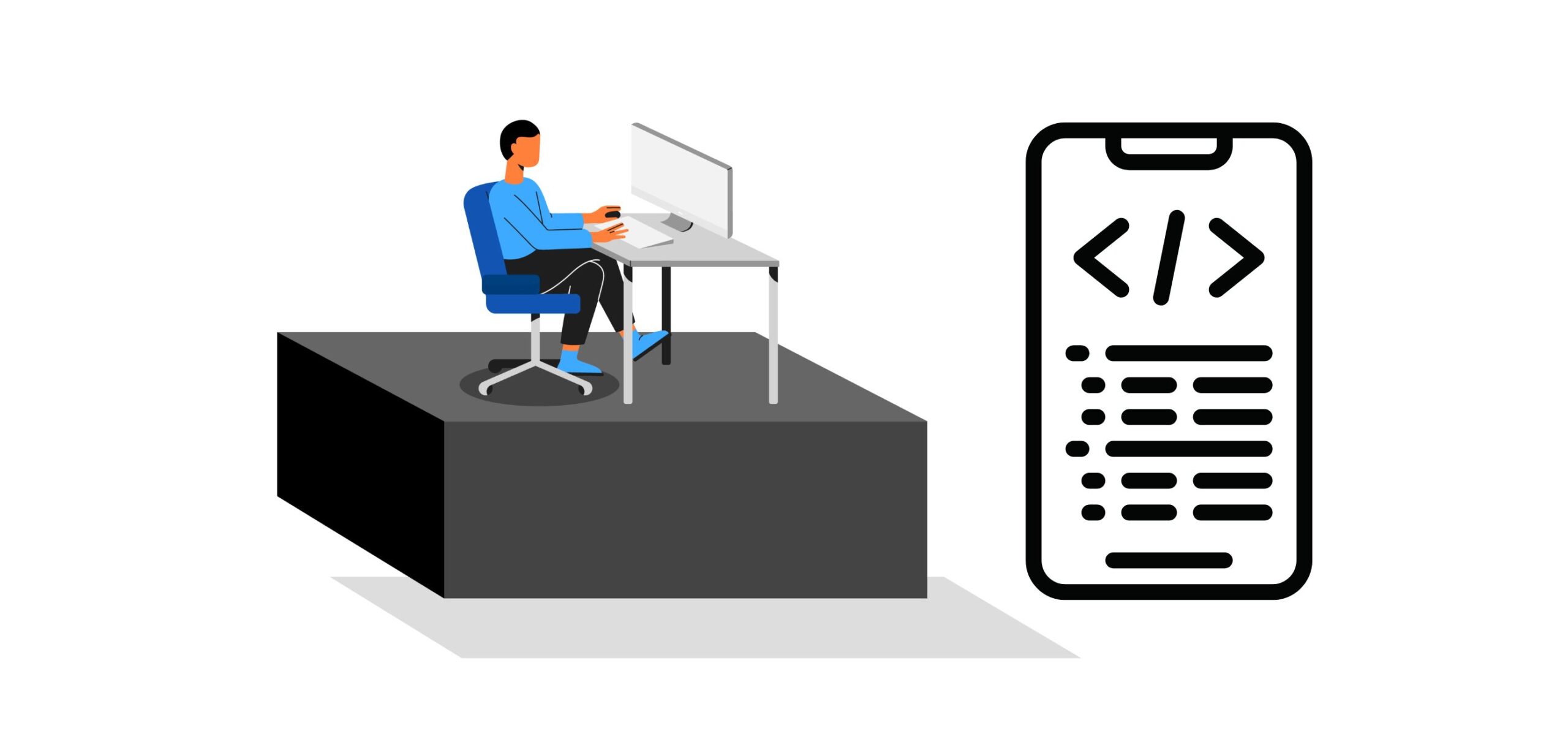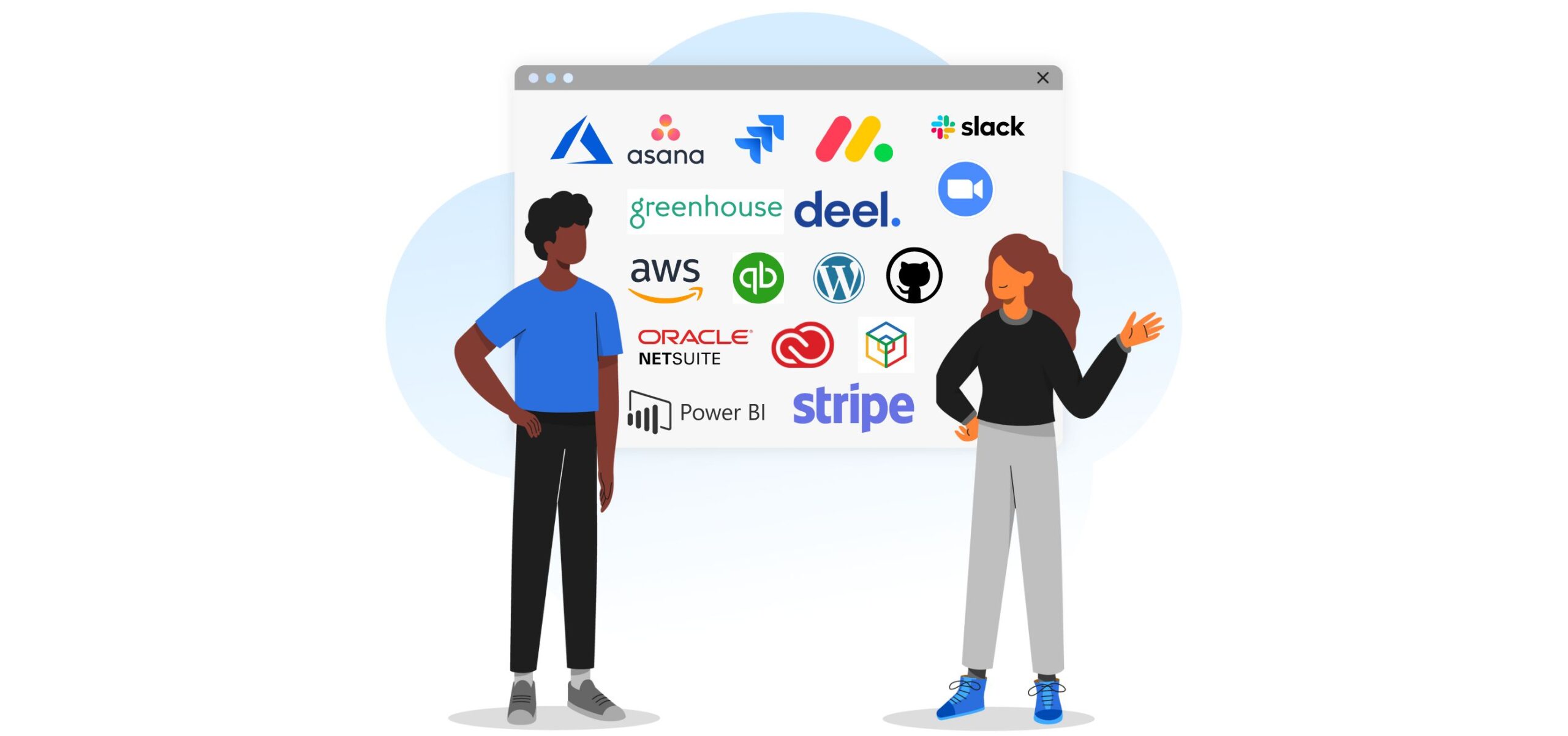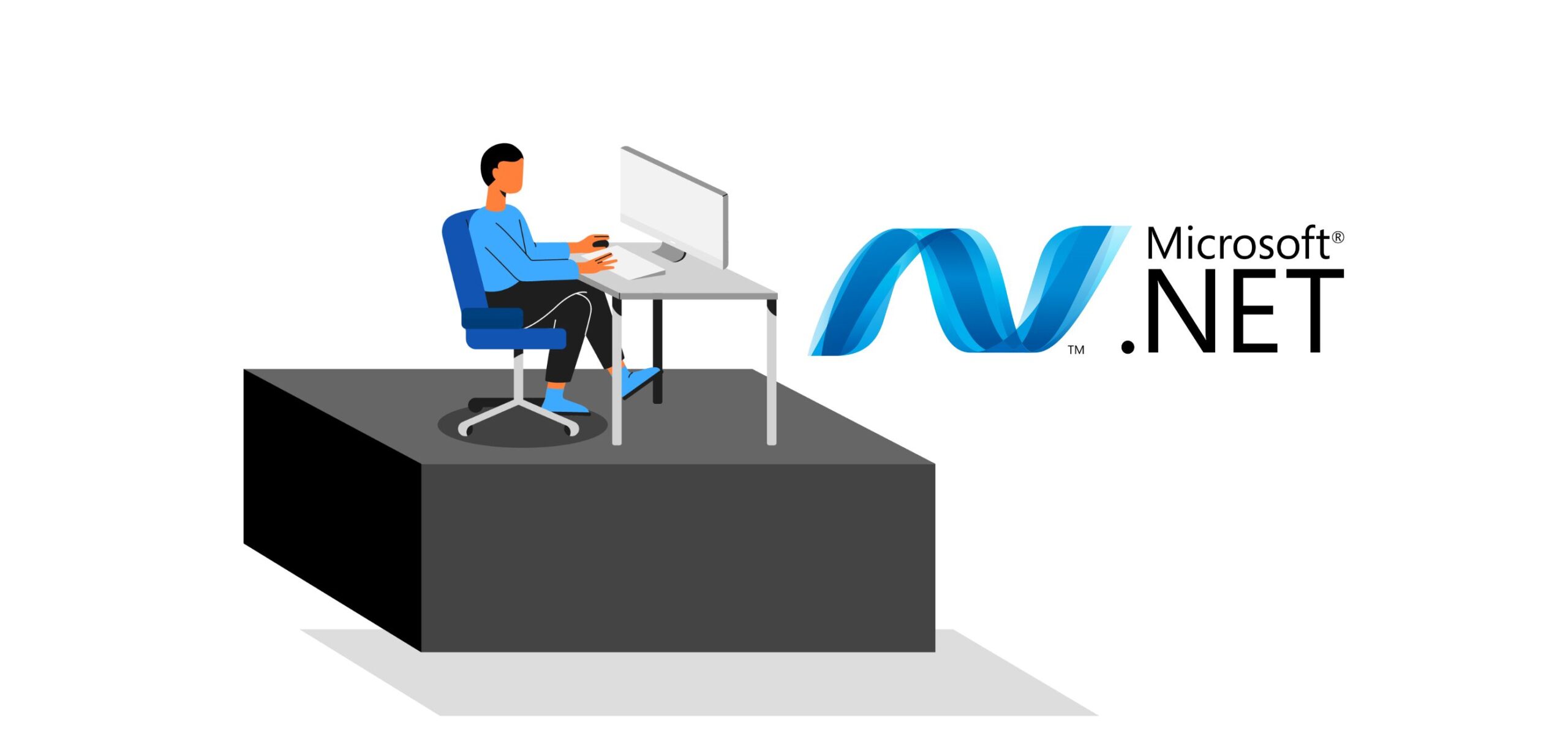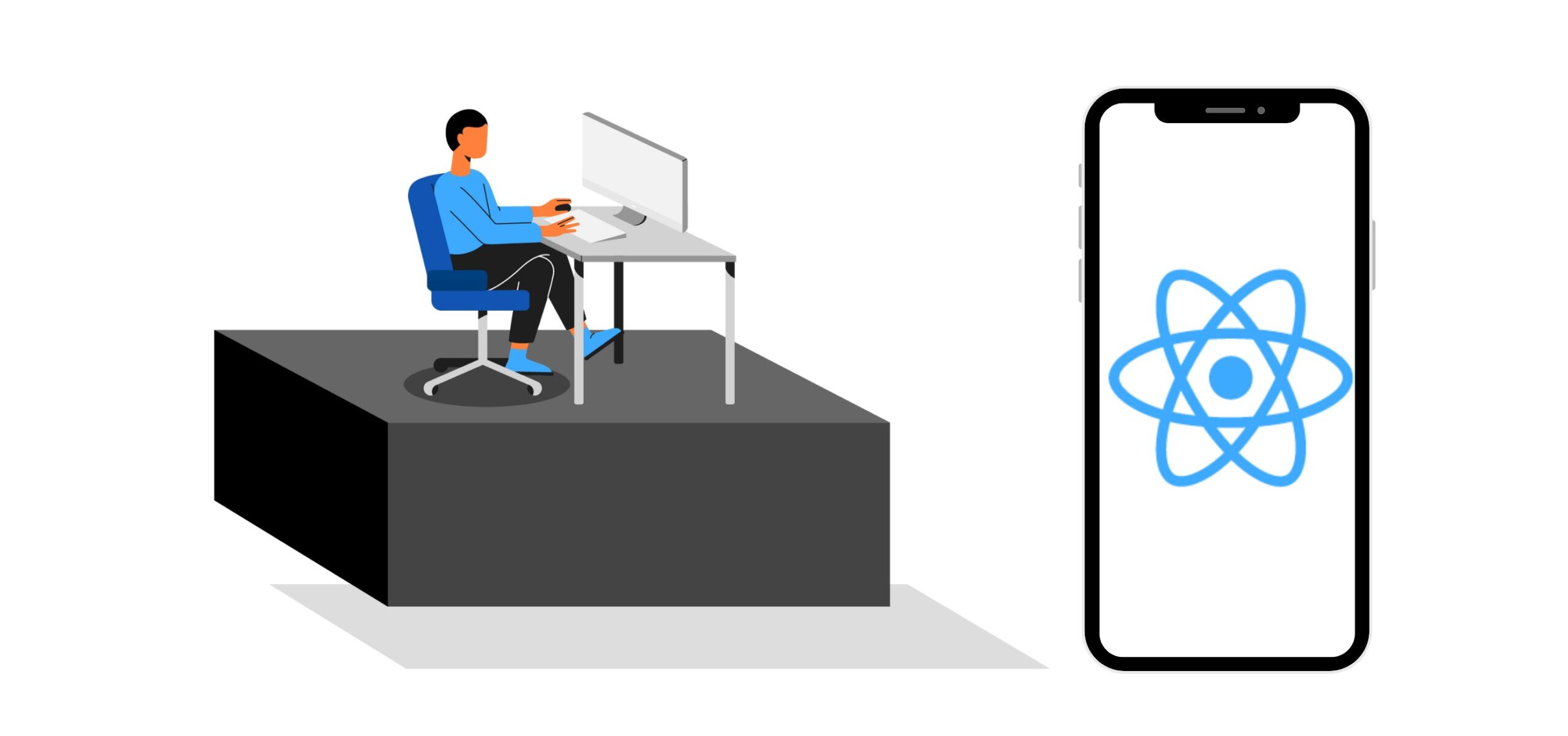Modern Digital Solutions: Harnessing Cutting-edge Technology for Mobile App Development
The modern digital landscape is replete with a new wave of technological breakthroughs, opening up new frontiers for businesses across the board. Cutting-edge technologies like AI, VR, and IoT are redefining the power of mobile app development. As we navigate through the digital age, the fusion of creativity and technology is driving a revolution in how we interact with our mobile devices.
To stay ahead of the curve, businesses must leverage state-of-the-art mobile app development technologies to provide customers with highly interactive and seamless solutions. But how do you build highly customized, feature-rich mobile applications? What high-end integrations can you include in your mobile app?
In this blog post, we explore these questions and dig deep into how innovative technologies are shaping the future of mobile apps, transforming user experiences, and reimagining the possibilities of what apps can do.
Let’s get started!
Benefits of modern mobile apps for businesses
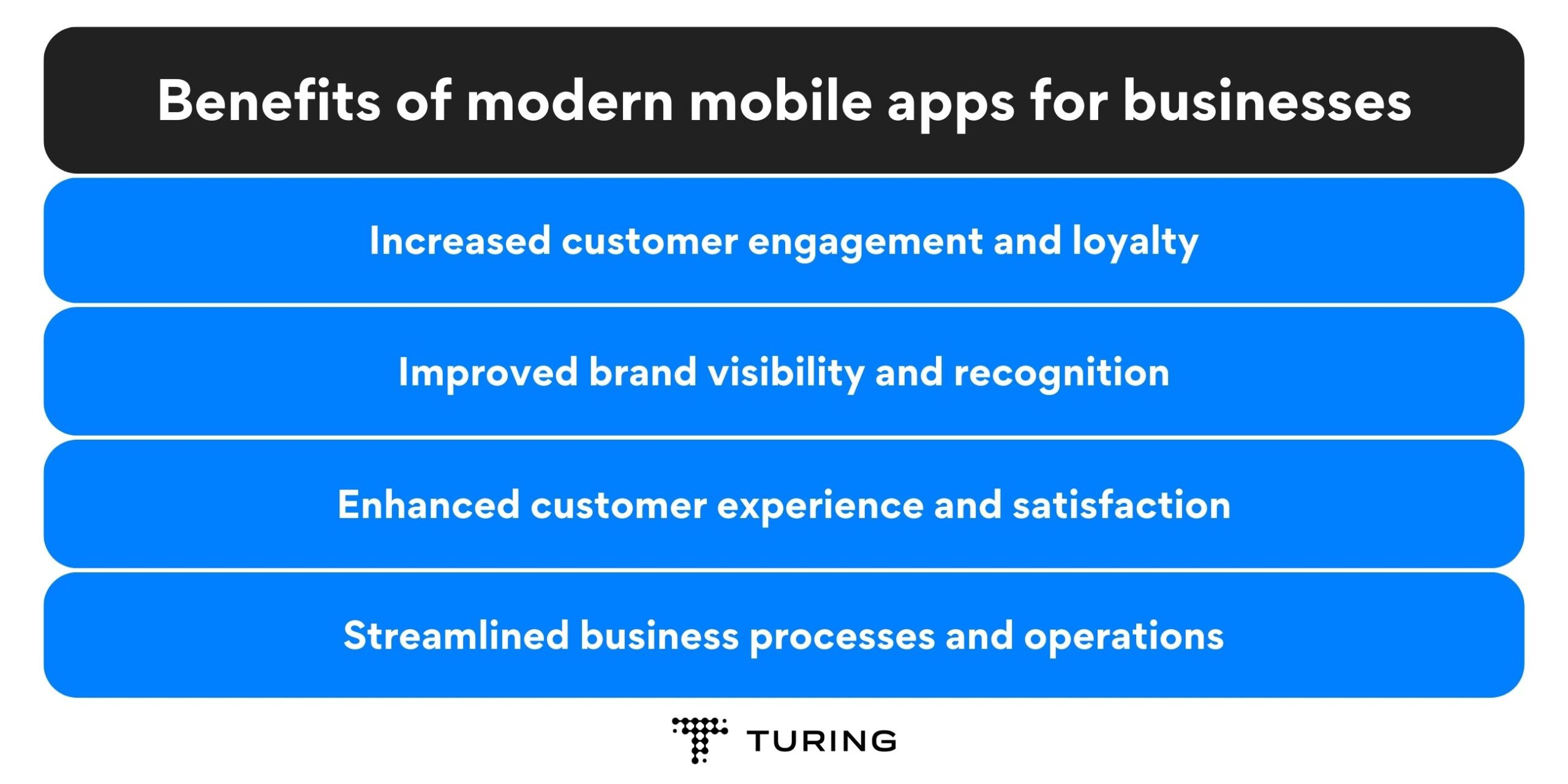
Benefits of modern mobile apps for businesses
The evolution of the mobile app development landscape has significantly impacted businesses, bringing connectivity and accessibility to users’ fingertips. Powering mobile apps with the latest technologies creates a powerful medium for delivering interactive customer experiences. Building a truly modern and scalable app offers several benefits, including:
-
Increased customer engagement and loyalty
Modern mobile apps enable businesses to connect deeply with customers, offering personalized experiences and tailored content. Features like push notifications, in-app messaging, and social media integration help companies engage users in real time. Businesses can leverage this engagement to iterate and improve their mobile apps for higher customer satisfaction. -
Improved brand visibility and recognition
Mobile apps are powerful marketing tools, allowing businesses to showcase their brand and offerings directly on users’ smartphones. Well-designed apps enable companies to reinforce their brand identity, stand out from competitors, and gain valuable exposure. Additionally, businesses can boost brand visibility and build a strong brand presence in the digital realm through app store optimization and strategic promotion. -
Enhanced customer experience and satisfaction
Modern mobile apps enhance customer experience by offering optimized, user-centric interfaces. A mobile app can deliver accurate and prompt services, such as product information, customer support, or transaction processing.
An app’s ability to provide real-time, personalized content with intuitive navigation can significantly boost customer satisfaction. This satisfaction often leads to positive reviews and word-of-mouth referrals, both invaluable for businesses. -
Streamlined business processes and operations
Modern mobile apps help streamline various business processes, automate tasks, and reduce manual efforts. These apps also facilitate seamless data exchange and synchronization through integration with backend systems and third-party APIs. This integration improves efficiency, accelerates decision-making, and optimizes resource allocation.
Mobile apps allow real-time monitoring and analytics and integrate secure payment options. These features empower businesses to make data-driven decisions and effectively adapt to evolving market demands.
Popular tools and technologies for mobile app development
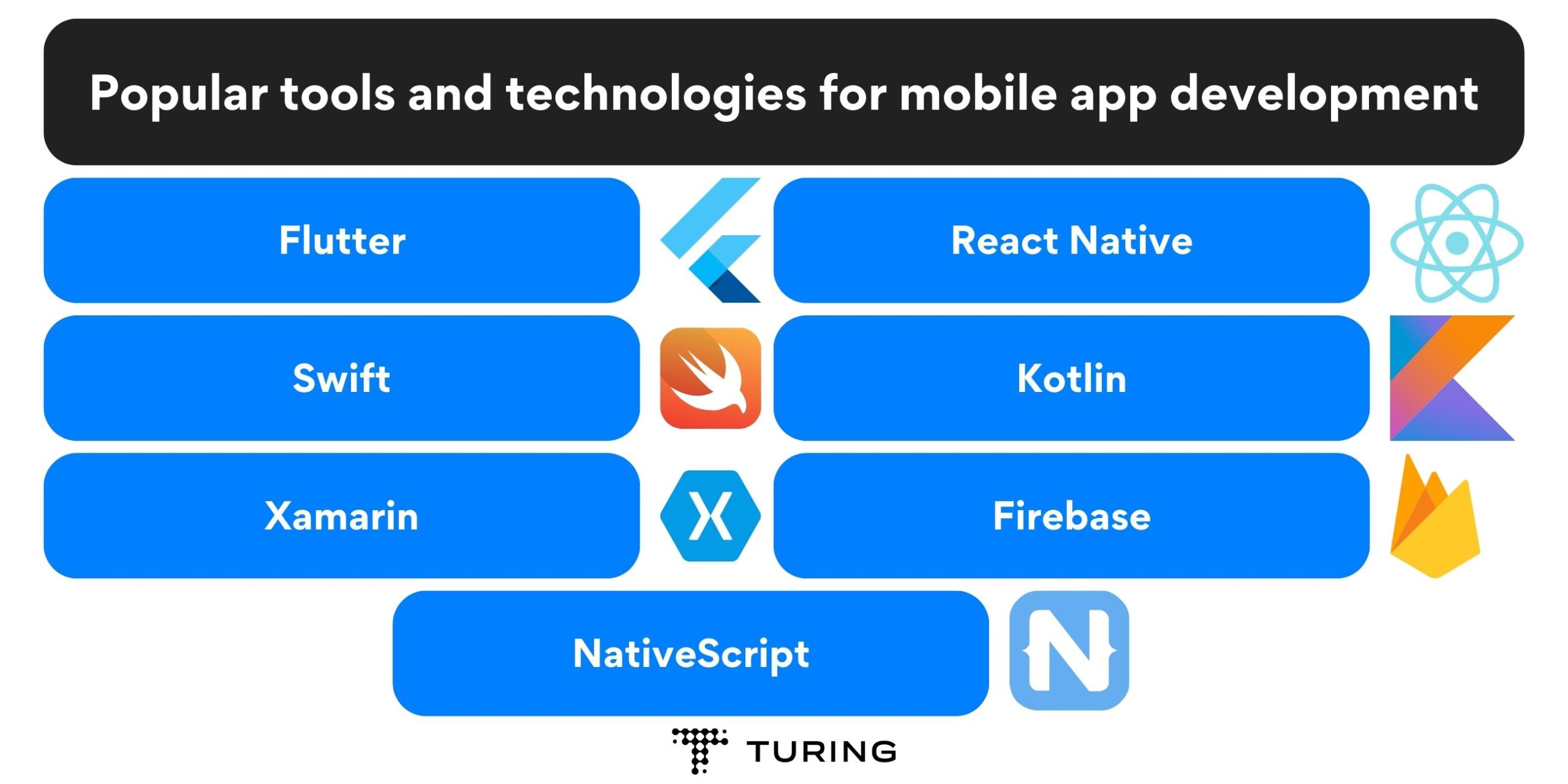
Popular tools and technologies for mobile app development
A wide range of tools, frameworks, libraries, and programming languages help to build powerful and robust mobile apps. These mobile app technologies have their strengths and limitations. Ultimately, the choice of mobile app technology depends on your business objective, app features, and budget.
Let us look at some prominent technologies for building interactive mobile apps.
-
Flutter
Flutter, developed by Google, has gained significant popularity among mobile app developers due to its versatility and efficiency in building cross-platform applications. It is an open-source UI software development kit (SDK) that allows developers to create visually appealing and high-performance apps for Android, iOS, web, and desktop platforms from a single codebase.
One of the key advantages of Flutter is its rich set of pre-designed widgets and layouts, providing a native-like user experience across platforms. It provides access to native device features and APIs, enabling seamless integrations and enhanced functionality. Flutter’s “hot-load” feature allows developers to instantly see their code changes in the app, promoting a faster development cycle and efficient debugging. -
React Native
React Native, a popular UI framework for building mobile apps, combines JavaScript’s power and native development’s efficiency. Developed by Meta, React Native lets developers create cross-platform apps using a single codebase.
React Native provides a component-based architecture and pre-built UI components, enabling faster development and code reusability. Developers can build apps for iOS and Android platforms while delivering a native-like performance and user experience. -
Swift
Swift, an in-demand programming language developed by Apple, caters specifically to iOS, macOS, and the Apple ecosystem. Its modern syntax and robust features enable developers to write clean, efficient, and highly maintainable code.
Swift offers seamless integration with Apple’s frameworks and APIs, providing access to a wide range of native features. Swift’s safety features, such as optional and type inference, boost code reliability and reduce common programming errors. -
Kotlin
Kotlin, a modern, high-level, general-purpose programming language, interoperates seamlessly with Java. Kotlin is widely used for Android app development due to its conciseness, expressiveness, and enhanced safety features. Kotlin integrates seamlessly with existing Java codebases, enabling developers to leverage the existing Android libraries and frameworks. Its features like null safety, type inference, and extension functions enhance developer productivity and code reliability. -
Xamarin
Xamarin is an open-source and robust framework for building cross-platform mobile apps. Xamarin, developed by Microsoft, leverages the power of C# and allows developers to write code once and deploy it across multiple platforms, including Android, iOS, and Windows. Xamarin offers a rich set of libraries and APIs, enabling access to native device features and functionalities. Xamarin’s code-sharing capabilities and extensive community support make it a popular framework for efficient cross-platform mobile app development. -
Firebase
Firebase is a comprehensive, open-source development platform for building modern and highly optimized Android, iOS, and Windows apps. Firebase, developed by Google, offers various services to simplify and accelerate the development process. Firebase provides a real-time database as one of its core features, enabling developers to build responsive and collaborative apps with synchronized data across devices.
Firebase offers cloud storage, authentication, and hosting services, allowing developers to secure user data and implement user authentication and authorization. Firebase also provides powerful analytics capabilities, offering insights into user behavior, app performance, and marketing campaigns.
With Firebase, you get a comprehensive suite of services to streamline the app development cycle, whether it’s a small prototype or a large-scale production app. -
NativeScript
NativeScript is a powerful, open-source framework for building native mobile apps using JavaScript or TypeScript. Developers can build cross-platform apps having access to native device APIs and UI components with NativeScript. The cross-platform apps enable seamless integration with local device capabilities, providing a native-like user experience.
NativeScript supports iOS and Android platforms and provides a rich set of UI components, plugins, and integrations to expedite development. NativeScript lets developers share code across platforms, reducing development time and effort. The developers also get the “hot reload” feature with NativeScript, offering real-time updates during development.
NativeScript’s ability to deliver high-performance apps with a native look & feel and its flexibility and code-sharing capabilities make it a popular choice for mobile app development.
What are the cutting-edge mobile app technologies for businesses?
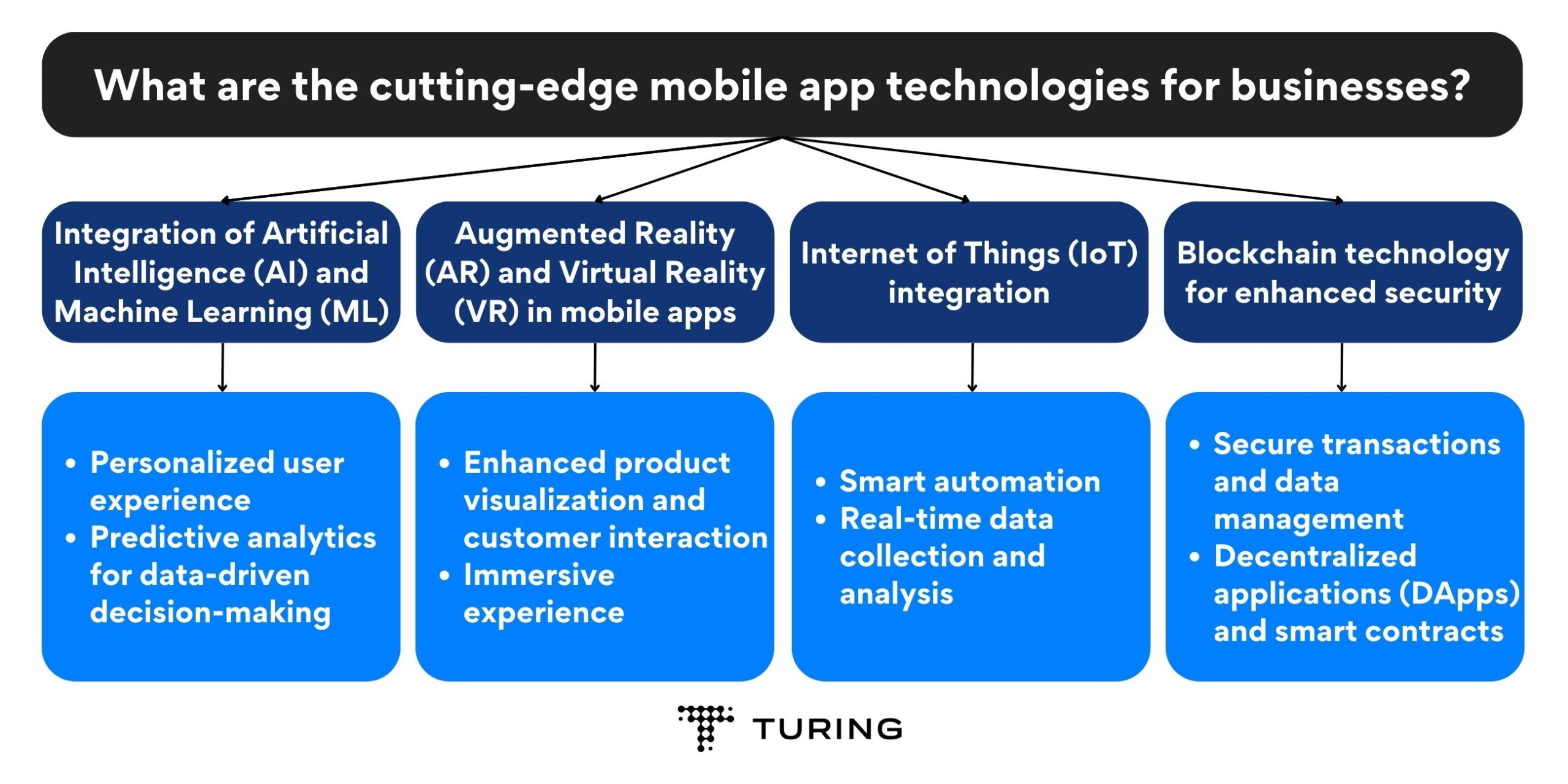
What are the cutting-edge mobile app technologies for businesses?
The integration of cutting-edge mobile app technology has increased significantly in recent times. With AI redefining automation and advanced learning, VR opening up new interactive experiences, and blockchain enabling secure transactions, there has never been a better time to amplify your app with these powerful features.
In this section, we explore various cutting-edge mobile app development technologies to optimize your app and offer advanced features to your end-users and customers.
-
Integration of Artificial Intelligence (AI) and Machine Learning (ML)
AI and ML technologies are revolutionizing mobile apps by enabling intelligent automation, personalized recommendations, and advanced data processing capabilities. Using AI and ML as primary mobile app technologies offers prominent benefits, including:-
Personalized user experience: By integrating AI and ML algorithms into mobile apps, businesses can automate repetitive tasks, enhance user engagement, and deliver personalized experiences. For example, AI-powered voice assistants and chatbots can provide instant customer support and advanced search options. Additionally, ML algorithms can analyze user behavior to offer personalized content and product recommendations.
-
Predictive analytics for data-driven decision-making: AI and ML algorithms, combined with predictive analytics, empower businesses to make data-driven decisions based on real-time insights. Mobile apps can collect and analyze vast amounts of data, including user interactions, demographics, and purchasing behavior. By leveraging this data, businesses can forecast trends, identify patterns, and predict user preferences, enabling targeted marketing campaigns, optimized pricing strategies, and inventory management.
-
-
Augmented Reality (AR) and Virtual Reality (VR) in mobile apps
Augmented reality and virtual reality are extremely popular among app developers as they transform user digital experiences. Here is what you can expect with AR and VR as a prominent component of your mobile app technology:-
Enhanced product visualization and customer interaction: Augmented reality (AR) overlays digital information onto the real world, enhancing user perception and interaction with their environment. AR has found substantial applications in mobile apps across various sectors. For instance, in retail, apps like IKEA Place allow users to visualize furniture in their space before purchase. Educational apps use AR to bring learning materials to life, while social media platforms employ AR for interactive filters and effects.
-
Immersive experience: Virtual reality, on the other hand, creates an entirely artificial digital environment. It typically immerses users in a simulated digital world through a VR headset. Here, mobile devices serve as a platform for VR experiences. For example, Netflix VR and YouTube VR enable users to consume content through VR headsets, creating highly immersive and rich user experiences.
-
-
Internet of Things (IoT) integration
The integration of the Internet of Things (IoT) in mobile applications offers revolutionary benefits to transform the way businesses operate and users interact with technology. Here is how users can benefit through the integration of this sophisticated mobile app technology:-
Smart automation: IoT’s ability to connect devices and facilitate communication among them empowers mobile apps to automate tasks seamlessly. From simple things like turning on lights when you enter a room to more complex processes like home security monitoring, a mobile application integrated with IoT can automate various tasks based on set conditions or triggers.
-
Real-time data collection and analysis: IoT devices constantly generate a wealth of data from their surroundings. When integrated with mobile apps, businesses can collect this real-time data, monitor it, and extract valuable insights. For example, health & fitness apps can gather real-time health data from wearable devices, providing valuable insights to users about their wellness.
Similarly, logistics companies use IoT-integrated mobile apps for real-time tracking of vehicles and goods. This real-time data collection and analysis enables businesses to make informed decisions, offer personalized services, predict trends, and improve their operations.
-
-
Blockchain technology for enhanced security
Blockchain technology is dramatically reshaping the world of mobile apps, setting new standards for security, transparency, and efficiency. Implementing blockchain technology into your mobile apps offers several features, including:- Secure transactions and data management: Blockchains are immutable, making transactions and data stored within them highly secure. Blockchain can revolutionize how data is shared and managed when incorporated into mobile apps. For example, in financial mobile apps, blockchain technology can ensure safe, peer-to-peer transactions, eliminating the need for intermediaries and reducing the risk of fraud.
- Decentralized applications (DApps) and smart contracts: DApps run on a P2P network rather than a single device. DApps interact with the blockchain to perform tasks and are characterized by their openness, decentralization, and incentivization. Today, many mobile apps are being created as DApps, taking advantage of these elements.
Smart contracts are self-executing contracts with the terms written into code, enabling secure transactions.
How to build robust and futuristic mobile apps for your business?
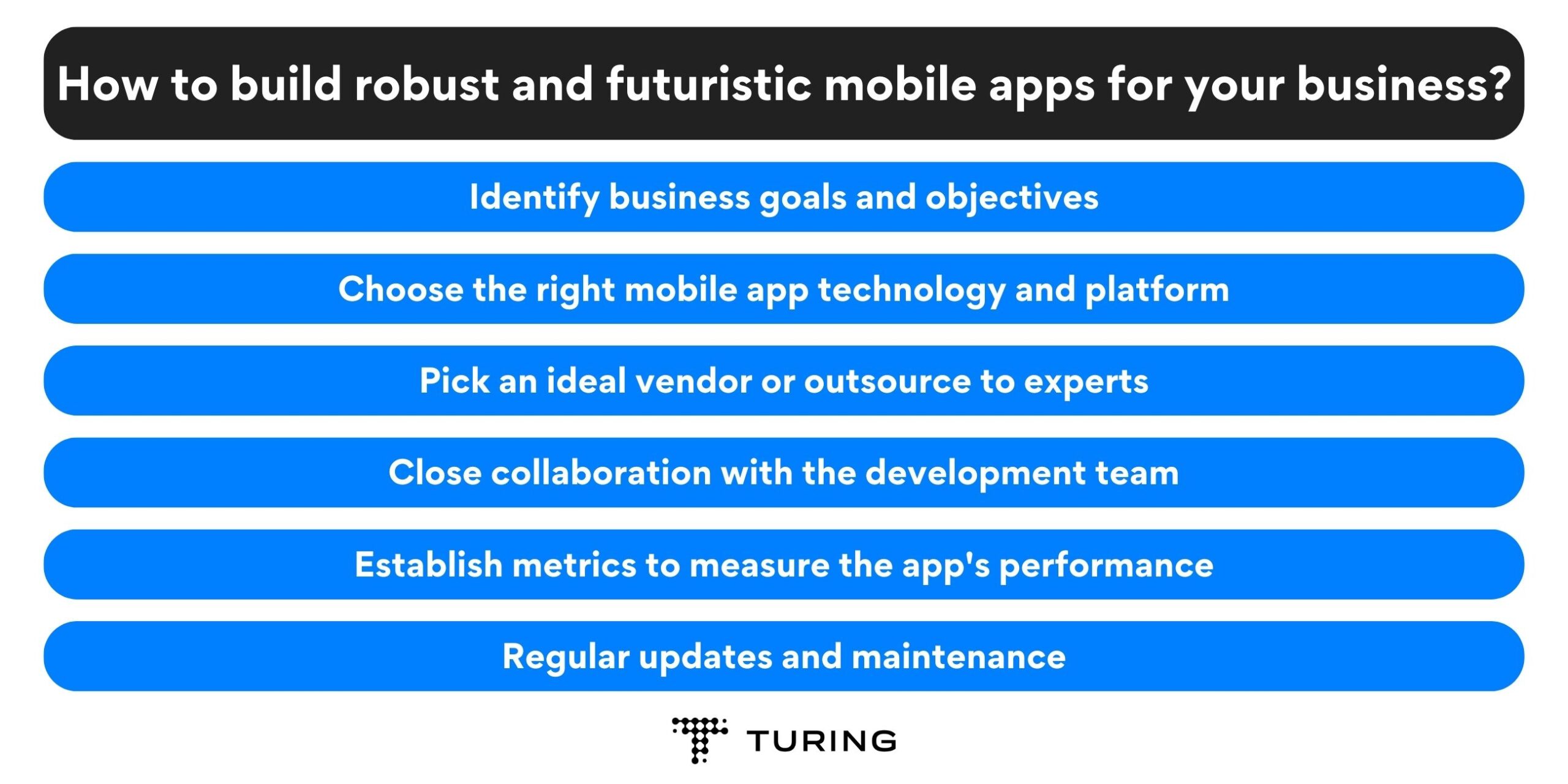
How to build robust and futuristic mobile apps for your business?
Whether you run a B2B or a B2C business, you need a feature-rich mobile app to enhance user experience and boost customer interactions and sales. Mobile apps are prevalent across different verticals and industries. However, if you want to stand out from the crowd and build a scalable and feature-rich mobile app, you must follow these steps:
-
Identify business goals and objectives
Before you develop a new app or modernize your existing app, it is critical to establish your business goals and objectives. Are you looking to increase sales, enhance customer engagement, streamline operations, or improve brand visibility? Having well-defined answers to these questions will help streamline your business strategy while providing a standard barometer for evaluating your mobile app performance and long-term success.
By understanding your goals, you can align your app development process accordingly. This information will help you prioritize features, design a user-centric experience, and select the right mobile app technology and functionalities for your app. -
Choose the right mobile app technology and platform
With transparent objectives and goals, you can select the most relevant and effective mobile app technology to build a mobile app, catering to your business requirements. The mobile app technology you choose is influenced by the following factors:-
Target audience and platform: Understand your target audience and the platforms these people use. Decide whether you need to build for iOS, Android, or both. Native development offers the best performance and platform-specific features, while cross-platform frameworks like Flutter or React Native provide code reusability and faster development.
-
Scalability and flexibility: Consider the future growth and scalability of your app. Choose a technology that can handle increasing user demands, evolving business needs, and integration with additional features and services.
-
User experience: Prioritize creating a seamless, highly responsive, and engaging user experience. Ensure the chosen technology supports smooth animations, responsiveness, and native-like interactions to engage users and provide a delightful experience. Here, decide which features you want and whether you want to integrate third-party services and APIs to enrich the customer experience.
-
Budget: Consider the development cost and time-to-market for the chosen technology. Balance the trade-offs between development speed, price, and desired features while adhering to security and industry best practices.
-
-
Pick an ideal vendor or outsource to experts
Experts with extensive industry experience should ideally handle your mobile app development project. Before you pick any specific vendor to develop your mobile apps, here are some factors you must consider:- Vendor portfolio: Conduct a thorough analysis of a vendor’s previous mobile app development projects. This information offers insight into their expertise and experience across different verticals.
- Client reviews: Client reviews indicate the quality of work a service provider delivers in a specific domain. Gather feedback from third-party platforms and independent forums for an unbiased perspective on the expected work quality.
- Technical proficiency: Assess the vendor’s technical proficiency and familiarity with the latest mobile app development technologies, frameworks, and platforms. Verify if the vendor can integrate modern features and functionalities within the app, providing a seamless user experience.
- Cost and value: Review the vendor’s pricing structure and evaluate the value they deliver. Balance the cost with their expertise, quality, and innovation.
- Collaboration and communication: Strong collaboration and communication with the vendor are key to successful app development. Evaluate their responsiveness, transparency, and willingness to understand your business objectives.
-
Close collaboration with the development team <h3>
Close collaboration with the development team is crucial for building robust and futuristic mobile apps for your business. This collaboration involves effective communication channels, feedback mechanisms, and a collaborative environment.
Strong collaboration ensures the team understands your app’s objectives, features, and design requirements, and addresses any issues or changes promptly. -
Establish metrics to measure the app’s performance
Establish relevant metrics to measure the app’s performance to build robust and futuristic mobile apps for your business. These metrics help you assess the app’s effectiveness and make data-driven decisions for improvement. Key performance indicators (KPIs) include user engagement, retention rates, conversion rates, app performance (load time, responsiveness), and user feedback.
Setting measurable goals and tracking relevant metrics provide insights into the app’s success and identify areas for optimization. -
Regular updates and maintenance
Building modern, scalable business apps doesn’t end with app development. Businesses must offer regular updates to introduce new features, enhancements, and improvements based on user feedback and market trends. This practice keeps your app relevant, competitive, and aligned with the evolving needs of your target audience.
Wrapping up
Today, businesses must leverage the latest mobile app technologies to build sophisticated and feature-rich digital experiences for their customers. Integrating the latest features powered by AI, IoT, AR & VR, and blockchain, allows businesses to build highly intuitive mobile apps that deliver on the promise of user-centric customer interaction.
Turing’s mobile app development services are built on modern technologies to help you scale complex challenges while offering the most effective solutions tailored to your needs. We combine innovation, creativity, and deep industry expertise to create powerful mobile apps that enrich the user experience and deliver high ROIs.
Book a call today and experience the difference a truly modern app can make to your business.
Tell us the skills you need and we'll find the best developer for you in days, not weeks.
